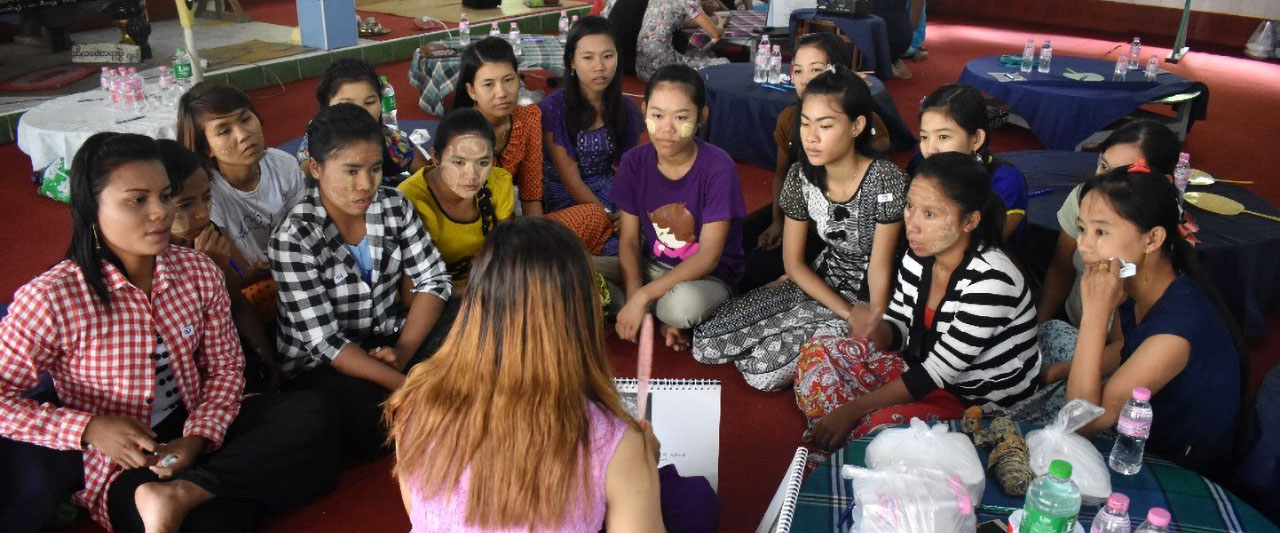Each year, thousands of young women from across Myanmar migrate to the sprawling Hlaingtharyar industrial zone in Yangon to take factory jobs. But the area has become a hot spot for unsafe abortion. Many of the young workers have little or no knowledge about sexual and reproductive health and rights, putting them on a pathway to unintended pregnancies and abortion by unsafe methods.
In partnership with the locally-based Hlaingtharyar Development Network (HDN), Ipas Myanmar is bringing vital information to young, female factory workers through an outreach project built around small group discussions on such topics as abortion, contraception and sexual health.
“What we have found,” says Myint Thu Lwin, community access advisor for Ipas Myanmar, “is that their knowledge of sexual and reproductive health is limited. They know about emergency contraceptives, for example, but the unmarried ones, especially, dare not buy them due to shame and fear of being blamed.”
Maternal health and abortion in Myanmar
- Unsafe abortion is the second-leading cause of maternal death
- Unmet need for modern contraception is high
- Adolescent pregnancy rate is increasing
- Induced abortion is legal only to save a woman’s life
- More than 250,000 women resort to unsafe pregnancies and unqualified practitioners for induced abortions each year
Sources: Myanmar Maternal Death and Surveillance Review, 2017; Ipas Myanmar: Fact Sheet, 2016



Most of the small group discussions, which are facilitated by HDN volunteers who have been trained by Ipas, involve eight female factory workers between the ages of 18 and 24. The young women meet every weekend over three consecutive months—and these sessions are generating positive results. One 22-year-old garment factory worker, for example, said she had gone to a health facility to get a long-lasting contraceptive method based on her new-found knowledge: “I realized that the emergency pill my boyfriend had been giving me after sex should not be used for regular contraception.” Another worker said the sessions “were very useful for young girl like me. I shared the information from the health talks with my coworkers and they said they would like to attend the sessions, too.”

Ipas trained volunteers from the Hlaingtharyar Development Network (HDN) in data collection methods for use in identifying health facilities and hostels where young, female workers were residing and areas where there were high rates of abortion.

Young people were involved in the outreach project from the beginning and were key to identifying the gaps in sexual and reproductive health knowledge that should be covered. They initially thought social media channels such as FaceBook would be the best way to share information —but realized that most young factory workers don’t have access to mobile phones and other digital devices. So they helped Ipas design simple visual materials, such as flip charts and story cards, to convey the information.
During COVID-19, the outreach continues
With evaluations showing that the small group discussions and sharing of educational materials are effective strategies, Ipas Myanmar is pressing forward to reach even more young factory workers in the Hlaingtharyar industrial zone and plans to expand the project into areas of Mon State as well. In addition to sharing sexual and reproductive health information during outreach sessions, Ipas is also including information on prevention of COVID-19 and urging the use of masks, hand washing and social distancing.

“We are hopeful that the knowledge we are sharing will be turned into practice. The voices of those participating in this outreach effort indicate that these young women are retaining and sharing the knowledge they have gained, and are turning it into positive health-seeking behaviors.”



